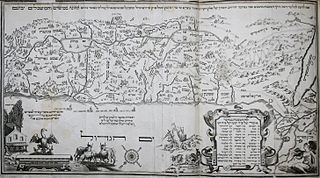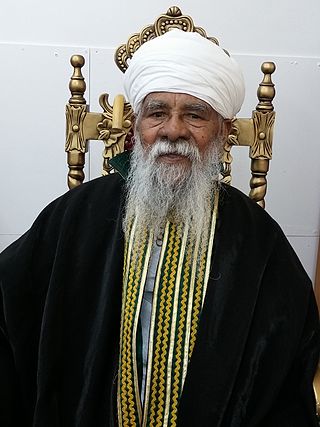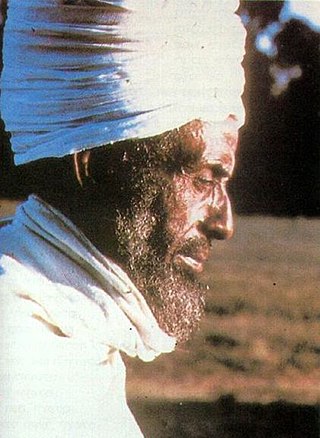
African Jewish communities include:

The Beta Israel, or Ethiopian Jews, are a Jewish diaspora group that lived for thousands of years in the territory of the Kingdom of Aksum and its successor the Ethiopian Empire, which is currently divided between the Amhara Region and Tigray Region in modern-day Ethiopia. After the founding of the State of Israel in 1948, most of the Beta Israel immigrated there or were evacuated through several initiatives by the Israeli government.
Jewish ethnic divisions refer to many distinctive communities within the world's Jewish population. Although "Jewish" is considered an ethnicity itself, there are distinct ethnic subdivisions among Jews, most of which are primarily the result of geographic branching from an originating Israelite population, mixing with local communities, and subsequent independent evolutions.
The history of the Jews in India dates back to antiquity. Judaism was one of the first foreign religions to arrive in the Indian subcontinent in recorded history. Desi Jews are a small religious minority who have lived in the region since ancient times. They were able to survive for centuries despite persecution by Portuguese colonizers and nonnative antisemitic inquisitions.
The Bnei Menashe is a community of Indian Jews from various Tibeto-Burmese ethnic groups from the border of India and Burma who claim descent from one of the Lost Tribes of Israel, allegedly based on the Hmar belief in an ancestor named Manmasi. Some of them have adopted Judaism. The community has around 10,000 members.

The Ten Lost Tribes were those from the Twelve Tribes of Israel that were said to have been exiled from the Kingdom of Israel after it was conquered by the Neo-Assyrian Empire around 720 BCE. They were the following: Reuben, Simeon, Dan, Naphtali, Gad, Asher, Issachar, Zebulun, Manasseh, and Ephraim—all but Judah and Benjamin, both of which were based in the neighbouring Kingdom of Judah and therefore survived until the Babylonian siege of Jerusalem in 587 BCE. Alongside Judah and Benjamin was part of the Tribe of Levi, which was not allowed land tenure, but received dedicated cities. The exile of Israel's population, known as the Assyrian captivity, occurred in line with long-standing Assyrian deportation policy, which was practiced in many subjugated territories.
Lalchhanhima Sailo was the founder of Chhinlung Israel People Convention (CIPC) and a leader in the Bnei Menashe community in Mizoram, India. His widow, Lalthlamuani, contested in the Lok Sabha Election 2019 from the Mizoram as an Independent, but lost to C. Lalrosanga of the Mizo National Front.
Aliyah from Ethiopia is the immigration of the Beta Israel people to Israel. Early forms of Zionism have existed in Ethiopia since the mid 19th-century, as shown in the 1848 letters from the Beta Israel to Jews in Europe praying for the unification of Jews. A year after the first letter was sent, Daniel Ben Hananiah and his son were sent by the Kahen to Jerusalem and made contact with the Jewish leaders there.

The history of the Jews in Ethiopia dates back millennia. The largest Jewish group in Ethiopia is the Beta Israel. Offshoots of the Beta Israel include the Beta Abraham and the Falash Mura, Ethiopian Jews who were converted to Christianity, some of whom have reverted to Judaism. Addis Ababa is home to a small community of Adeni Jews. Chabad also maintains a presence in Addis Ababa.
Israeli Jews or Jewish Israelis comprise Israel's largest ethnic and religious community. The core of their demographic consists of those with a Jewish identity and their descendants, including ethnic Jews and religious Jews alike. Approximately 99% of the global Israeli Jewish population resides in Israel; yerida is uncommon and is offset exponentially by aliyah, but those who do emigrate from the country typically relocate to the Western world. As such, the Israeli diaspora is closely tied to the broader Jewish diaspora.

Raphael Hadane, also known as Hadana Takoya, was the Liqa Kahenat of Beta Israel in Israel.

Igbo Jews are members of the Igbo people of Nigeria who practice Judaism. It is a tenet of their beliefs that they have ties to one of the lost tribes of Israel, the tribe of Gad.
Ethiopian Jews in Israel are immigrants and descendants of the immigrants from the Beta Israel communities in Ethiopia who now reside in Israel. To a lesser, but notable, extent, the Ethiopian Jewish community in Israel is also composed of Falash Mura, a community of Beta Israel which had converted to Christianity over the course of the past two centuries, but were permitted to immigrate to Israel upon returning to Israelite religion—this time largely to Rabbinic Judaism.

Uri Ben Baruch was a Liqa Kahnet and the main leader of the Ethiopian Jewish community for nearly 50 years, from the Italian occupation of Ethiopia until his death.
Taamrat Emmanuel was a Jewish Ethiopian public figure, professor, rabbi and intellectual. Taamrat was one of the most prominent figures in the Beta Israel community in the Jewish Enlightenment movement and in the Early modern period.

Pnina Tamano-Shata is an Israeli lawyer, journalist, and politician. The first Ethiopia-born woman to enter the Knesset in 2013, in 2020 she also became the first Ethiopia-born minister after being appointed Minister of Immigrant Absorption.
Shalva Weil is Senior Researcher at The Seymour Fox School of Education at the Hebrew University of Jerusalem, Israel, and Life Member at Clare Hall, University of Cambridge, UK. In 2017, she was GIAN Distinguished Professor at Jawaharlal Nehru University, in New Delhi. She has researched Indian Jews, Ethiopian Jews, Baghdadi Jews, the Ten Lost Tribes and Femicide.
Ethiopian Jewish cuisine is the cuisine of the Beta Israel. The cuisine of the Ethiopian Jews is similar to the cuisine of other Ethiopians, with some variations.
African Americans in Israel number at least 25,000, comprise several separate groups, including the groups of African American Jews who have immigrated from the United States to Israel making aliyah, non-Jewish African Americans who have immigrated to Israel for personal or business reasons, pro-athletes who formerly played in the major leagues in the United States before playing in Israel on local basketball and other sports teams, as well as foreign students studying in Israeli universities, businessmen, merchants, and guest workers, along with Israeli citizens of African American ancestry. African Americans have served in the Israel Defence Force, and have largely been accepted and into Israeli society, and have represented Israel in numerous international forums such as the Olympic Games, and the Eurovision Song Contest. African American-Israelis have had a major cultural impact in Israel, particular in the arts and culture, music and sports. In addition, there as a large community of Black Hebrew Israelites numbering at least 5,000 people, who originally immigrated to Israel from Chicago in the 1960s, and live mostly in the southern Israeli town of Dimona.








